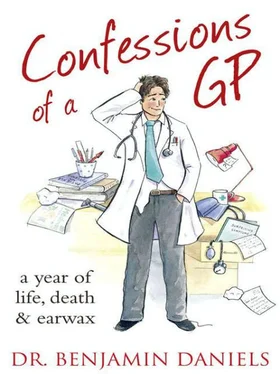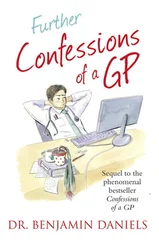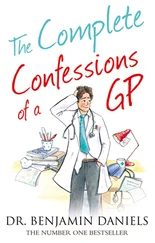My most dramatic witnessing of the healing power of the mind occurred during my time working in Mozambique. A middle-aged woman presented herself to the ward in absolute hysterics. She owed her village witch doctor money that she couldn’t afford to pay and he had put a curse on her. The woman was convinced that she would die shortly and was screaming and throwing herself onto the floor and beating the ground. We managed to keep her still for a few minutes to do some basic observations and I have never known someone to have a pulse and blood pressure so high. It was quite possible that she could die from a heart attack simply because of the immense stress her body was under.
The head of medicine was a German professor who was always particularly impatient with the local people’s spiritual beliefs and superstitions. ‘There is no such thing as witchcraft!’ he shouted at the woman as she writhed and screamed on the ground. The woman took no notice and carried on wailing as her blood pressure and heart rate continued to rise to increasingly dangerous levels. One of the local doctors took a very different approach. ‘I can break the spell,’ he told her authoritatively. He took some magical stones from his pocket (some gravel from the hospital courtyard) and started chanting and throwing his arms around. After several minutes, he dramatically threw the gravel to the feet of the hysterical woman and announced in a booming voice that she was cured. The woman collapsed into an exhausted heap and started to whimper. Her blood pressure and heart rate were normal within a few minutes and she happily headed home to her village. ‘If you look convincing enough, these people will believe anything,’ the doctor remarked to me after I had looked on in astonishment. He then calmly asked one of the nurses to sweep up the gravel and we carried on with the ward round.
A patient once told me that she had turned to homoeopathy as she didn’t feel that she was treated holistically by modern medicine. I felt a little offended by this. The different ways in which health and illness are perceived by different classes, cultures and ages are perhaps more evident to GPs than to anyone else. A good GP should, by definition, recognise the delicate balance between mind, body and spirit in the treatment of his or her patients. It’s not always easy to take all these multiple factors into consideration with our limited time and resources but most of us do try. We appreciate the importance of emotional factors in physical symptoms and that illness can affect patients, their families and their environments in a myriad of different ways. This patient who had turned her back on conventional medicine clearly felt let down by modern doctors. I personally won’t be prescribing any alternative treatments, but I do think that I could learn a lot from the techniques and holistic approaches of many complementary practitioners.
As I mentioned in ‘Who am I?’ I love being an observer and sometimes playing a part in the soap operas that are people’s lives. In real soap operas, the watcher can only shout at the telly when a character is clearly heading for a fall. As a GP, sometimes I have the opportunity to step in, but the problem is knowing whether it is the right thing to do. This was the problem I faced with John.
John had been my patient for a year or so. He was a nice enough bloke but struggled with poor social skills and he was also not particularly blessed in the good looks department. Perhaps unsurprisingly, he had reached his forties without ever having been in a serious relationship and so decided to go on a trip to Thailand to find a wife. I remember him coming to see me before his trip, nervously asking for advice on travel vaccines and malaria prophylaxis. Maybe I should have made the suggestion then that a two-week holiday to Bangkok was perhaps not the best way to find true love. However, I stayed quiet and a few months later John came to see me in order to register his new wife as a patient. Sung was 19. She was beautiful, elegant and also looked absolutely terrified. John looked like the cat who had got the cream. I can’t imagine anything more frightening than being plucked from your family, friends and country, to be put into a cold, grey, unfriendly town with a much older and slightly odd man who was now your husband. She also barely spoke a word of English. Perhaps it was true love but I doubted it.
John was present during my first consultation with Sung. I asked Sung a question and when she looked at me blankly, John offered to help translate. I was impressed that John had learnt Thai, only to find that instead of translating my question into Sung’s native language, he just repeated it in English but shouted in a slightly odd stereotype of a Chinese accent. It was like a Russ Abbot sketch from the 1980s.
After a few months, while her husband was at work, Sung started to learn English at a language school and took a part-time job in a burger bar with other students her age. It was not long after this that John came to see me with symptoms of painful discharge from his penis. I did a swab because I suspected chlamydia. Chlamydia can hang around undetected for a long time, but I didn’t think that John had been anywhere near a woman for years until Sung came along. John had also proudly told me that Sung was a virgin when they got married. It seemed fairly obvious to me that Sung was sleeping around, but what did I tell John? When the results came back from his swab, I explained that chlamydia was a sexually transmitted infection and advised that Sung came in to be tested and treated as well. Despite them both having a course of antibiotics, John came back with another sexually transmitted infection not long afterwards. I tried to hint gently that these infections were probably coming from outside of the marriage but John simply couldn’t accept that this could be possible. How much right did I have to interfere with this relationship? John was blinkered and in love. Sung was 19 and having fun with lads of her own age. I was watching this car crash unfold each week. If John were a friend, maybe I would have given him a shake and pointed out the obvious, but he wasn’t a friend, he was my patient.
A few months later, Sung left John for a 20-year-old boy who played bass in a band. John was devastated and ended up on antidepressants. ‘Why didn’t you tell me she was being unfaithful?’ he blubbed. What could I say? My job was to point out the facts and hope that John reached his own conclusions. Perhaps I should have made those facts a little clearer.
I’ve seen loads of dead people but I’m still quite scared of corpses. As a hospital doctor, one of my jobs was to go and certify death. During a night on call, I would be covering ten or more wards and be up most of the night doing odd jobs and reviewing sick patients. I recall one night when, after having just got to bed at about 4 a.m., my pager went off. The nurse on one of the geriatric wards told me that one of the patients had died. It was an expected death so although there was no resuscitation and CPR necessary, a doctor needed to certify the death before the body could be taken to the morgue.
It was a cold dark night and I had to force myself out of my warm bed to make the long trudge from the on-call room to the hospital. ‘Room 12,’ the nurse said as I wandered on to the ward. Rubbing the sleep from my eyes, I stumbled into the darkened side room. To certify death, a doctor has to ensure the patient isn’t breathing, that his heart isn’t beating, that his pupils are fixed and dilated and that he doesn’t respond to pain. The pain response is usually elicited by rubbing your knuckles really hard onto the front of the person’s chest. It is call it a sternal rub. It hurts like hell and we also use it a lot on alive patients in A&E, as it wakes people from even the deepest drunken stupor. The room was dark and quiet and I was all alone with the body lying in the bed in front of me. Still half-asleep I decided to start with the pain response. As I pressed my knuckles hard onto the corpse’s chest, it jumped up, grabbed my hand and let out an ear-piercing scream. This was soon joined by an equally loud and terrified scream that was being emitted by me. The nurse then flew into the room and said, ‘Sorry, Doctor, did I say room 12? I meant room 10.’
Читать дальше
Конец ознакомительного отрывка
Купить книгу











![Benjamin Franklin - Memoirs of Benjamin Franklin; Written by Himself. [Vol. 2 of 2]](/books/747975/benjamin-franklin-memoirs-of-benjamin-franklin-wr-thumb.webp)
![Benjamin Franklin - Memoirs of Benjamin Franklin; Written by Himself. [Vol. 1 of 2]](/books/748053/benjamin-franklin-memoirs-of-benjamin-franklin-wr-thumb.webp)